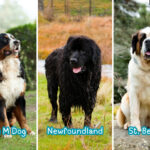 6 Nov
6 NovAre Rottweilers Good for First-Time Dog Owners?
If you’re considering a Rottweiler as your inaugural four-legged friend, you’re probably weighing the pros and cons, seeking to make an informed decision. It’s a common question in dog-owner circles: Are Rottweilers good for first-time owners?
Yes, Rottweilers can be a good choice for first-time dog owners who are committed to consistent, firm training and can set clear boundaries. They are intelligent, loyal, and protective dogs that respond well to positive reinforcement and can thrive in a loving home environment.
First-time owners must have a strong understanding of dog behavior and provide ample exercise, socialization, and affection. Rottweilers are known for their confident demeanor and unwavering loyalty. They’re the kind of dogs that offer both protection and partnership, a real asset to families and individuals alike.
But it’s no secret that they also come with a set of demands and responsibilities that can be quite daunting for a newbie. So, it’s crucial to look beyond their impressive stature and deep bark to understand what it truly takes to raise a Rottweiler.
This post isn’t just a run-of-the-mill overview; it’s a practical guide tailored for you, the first-time dog owner who’s considering a Rottweiler as your companion. We’ll look at what these magnificent dogs need regarding training, space, and attention, and we’ll balance that with what they offer in terms of companionship and family life.
By the end of this article, you’ll have a clearer picture of whether a Rottweiler is the right dog to start your pet ownership journey with. So, let’s march forward, shall we?

Understanding the Rottweiler Breed
Rottweilers stand among the most ancient of dog breeds, with a lineage tracing back to the Roman Empire. Originally bred to herd livestock and pull carts for merchants, this breed was named after the German town of Rottweil, where they gained prominence as working dogs.
Throughout history, Rottweilers have been valued for their strength, intelligence, and loyalty, qualities that have seen them transition into modern roles such as police, service, and therapy dogs. When it comes to temperament, Rottweilers are often described as confident, fearless, and good-natured. They possess a calm assurance and a steadfast presence that many owners find reassuring.
This breed is known for its deep bond with its family, showing a natural inclination to protect its loved ones. With a Rottweiler, you have a companion that is both a vigilant guardian and a loving pet. That said, they require early and consistent socialization and training to ensure they develop a well-rounded character.
Rottweilers are large, robust dogs with a powerful build. They carry themselves with a noble and unyielding stance. Males typically stand between 24 to 27 inches at the shoulder, while females are usually between 22 to 25 inches. Their black coat with distinctive tan markings is short but thick, necessitating regular grooming.
As for exercise, Rottweilers are an active breed that thrives on having a job to do. They require regular, vigorous exercise to maintain their muscular physique and to stave off boredom – which can lead to destructive behaviors. A Rottweiler’s exercise regimen should include not only physical challenges but also mental stimulation to satisfy their intelligent minds.
The Challenges of Rottweiler Ownership
Owning a Rottweiler comes with a set of challenges that, while manageable, are important for prospective owners to understand and prepare for.
The Importance of Training and Socialization
The foundation of a well-behaved Rottweiler lies in early, consistent, and positive training. Their intelligence and willpower require an owner who can provide firm and loving guidance. Socialization is equally critical; Rottweilers need to be exposed to various people, places, and situations from a young age to build a well-adjusted temperament.
Without proper training and socialization, a Rottweiler’s protective instincts can become problematic, potentially leading to aggressive behaviors towards strangers or in unfamiliar situations.
Dealing with the Rottweiler’s Strength and Size
A fully-grown Rottweiler is a force to be reckoned with. They possess remarkable strength and can be overwhelming if not trained to obey commands, especially on a leash. This can pose a challenge for owners who may not have the physical strength or experience to handle such a powerful dog. Therefore, it’s crucial for owners to establish control and leadership to prevent the dog from assuming the dominant role in the household.
Legal and Insurance Considerations (Breed-Specific Legislation)
Rottweilers, like other large breeds, often face breed-specific legislation (BSL). These laws can restrict ownership or require special conditions like liability insurance or secure containment measures. Prospective Rottweiler owners need to be aware of local laws and insurance policies that may affect their ability to keep the breed. In some areas, owning a Rottweiler can lead to challenges with securing homeowners’ insurance or finding rental housing.
Grooming and Health Issues Specific to Rottweilers
While Rottweilers have a relatively low-maintenance coat, they do shed, especially during the change of seasons, and will require regular grooming. Health-wise, they are prone to certain genetic conditions such as hip dysplasia, elbow dysplasia, and heart issues.
Responsible breeding practices can help mitigate these risks, but owners should be prepared for the possibility of these health challenges and the associated costs. Regular veterinary check-ups, a proper diet, and adequate exercise are key to maintaining a Rottweiler’s health.
The Rewards of Owning a Rottweiler
Despite the challenges that come with owning a Rottweiler, the rewards can be immense for those who are well-prepared to take on this breed.
Loyalty and Protective Nature of Rottweilers
Rottweilers are often revered for their unwavering loyalty. They form an intense bond with their family, offering not just companionship but a profound sense of protection. This protective instinct, when coupled with proper training, makes them excellent watchdogs.
They are naturally inclined to guard their home and loved ones, providing a sense of security that few other breeds can match. Their presence alone can act as a deterrent to unwelcome visitors, yet they are also known to be affectionate and gentle with their family, showing a softer side behind their robust exterior.

Intelligence and Trainability
Rottweilers are highly intelligent dogs, which makes them particularly trainable. They have a storied history of working closely with humans in various capacities, from herding to search and rescue, and this intelligence means they are capable of learning a wide array of commands and tasks. Positive reinforcement techniques work well with Rottweilers, and with the right approach, they can excel in obedience training, agility, and even service dog functions. Their quick learning ability is a reward in itself, as it opens up opportunities for a range of activities and jobs that can be both enjoyable and fulfilling for the dog and owner alike.
Alternatives to Rottweilers for First-Time Owners
While Rottweilers are admirable dogs, their needs and characteristics might not make them the ideal choice for everyone, especially those new to dog ownership. Here are some alternatives that might be more suited to first-time owners:
Other Breeds to Consider for First-Time Owners
- Labrador Retrievers: Known for their friendly nature and trainability, Labs are often recommended for first-time owners. They are good-natured, loving, and patient with children.
- Golden Retrievers: Similar to Labs, Golden Retrievers are gentle, smart, and eager to please, making training a joy for novices.
- Boxers: While they have a lot of energy, Boxers are also highly trainable and known for their loyalty and affection toward families.
- Cavalier King Charles Spaniels: These smaller dogs are adaptable, affectionate, and good with families and other pets, making them a less daunting option for first-timers.
- Bichon Frise: This breed is small, friendly, and requires less exercise than larger breeds, making them ideal for those with less space.
- Poodles: Intelligent and eager to learn, Poodles of all sizes are known for their hypoallergenic coats and amiable disposition.
The Pros and Cons of Starting with a Less Demanding Breed
Pros
- Ease of Training: Breeds known for their trainability can offer a smoother learning curve for first-time dog owners.
- Size: Smaller to medium-sized dogs can be easier to handle, especially if they will be sharing a smaller living space with their owner.
- Temperament: Breeds with a reputation for being friendly and less aggressive can be easier for first-time owners to socialize.
- Grooming and Health: Some breeds have fewer grooming needs and are less prone to certain genetic health issues, potentially making for a less intensive care experience.
Cons
- Exercise Requirements: Even less demanding breeds require exercise, and failing to meet these needs can lead to behavioral issues.
- Attention and Companionship: All dogs need companionship and mental stimulation; without it, even the most easy-going breeds can develop separation anxiety or destructive behaviors.
- Individual Variability: Even within breeds known for being great for first-time owners, individual dogs can have their own unique challenges.
Preparing to Bring a Rottweiler Home
Embracing the role of a Rottweiler owner is a rewarding experience that requires preparation and education. If you’ve decided that a Rottweiler is the right fit for your first foray into dog ownership, here’s how to get started:
Finding a Reputable Breeder or Rescue
To ensure you’re bringing home a healthy and well-socialized Rottweiler, it’s crucial to connect with a reputable breeder or a trustworthy rescue organization. A good breeder will prioritize the health and temperament of their puppies, offer transparency about genetic testing, and allow you to meet the puppy’s parents and see where they’ve been raised.
If opting for a rescue, look for organizations that provide thorough behavioral assessments and veterinary care for their dogs. In either case, they should be willing to answer all your questions and offer guidance on how to care for your Rottweiler.
Home Preparation and Essential Supplies
Before your Rottweiler arrives, your home should be puppy-proofed, with hazardous items out of reach and a comfortable space designated for your new companion. Essential supplies include:
- A sturdy leash and collar, preferably with an ID tag. A comfortable and appropriately sized crate to aid in-house training and provide a safe haven.
- High-quality dog food is recommended for large breeds, along with durable food and water bowls.
- Chew toys and interactive toys to keep them mentally and physically stimulated.
- Grooming tools such as a brush, nail clippers, and dog shampoo.
- A dog bed or blanket for a designated sleeping area.
Importance of Ongoing Education and Support
Owning a Rottweiler is a long-term learning experience. Engaging in ongoing education about the breed’s behavior, training, and health needs is vital. This can include reading reputable resources, joining breed-specific groups, and participating in training classes.
Support can also come from connecting with a network of fellow Rottweiler owners, trainers, and veterinarians who can offer advice and help you navigate the unique challenges and rewards of raising a Rottweiler.




